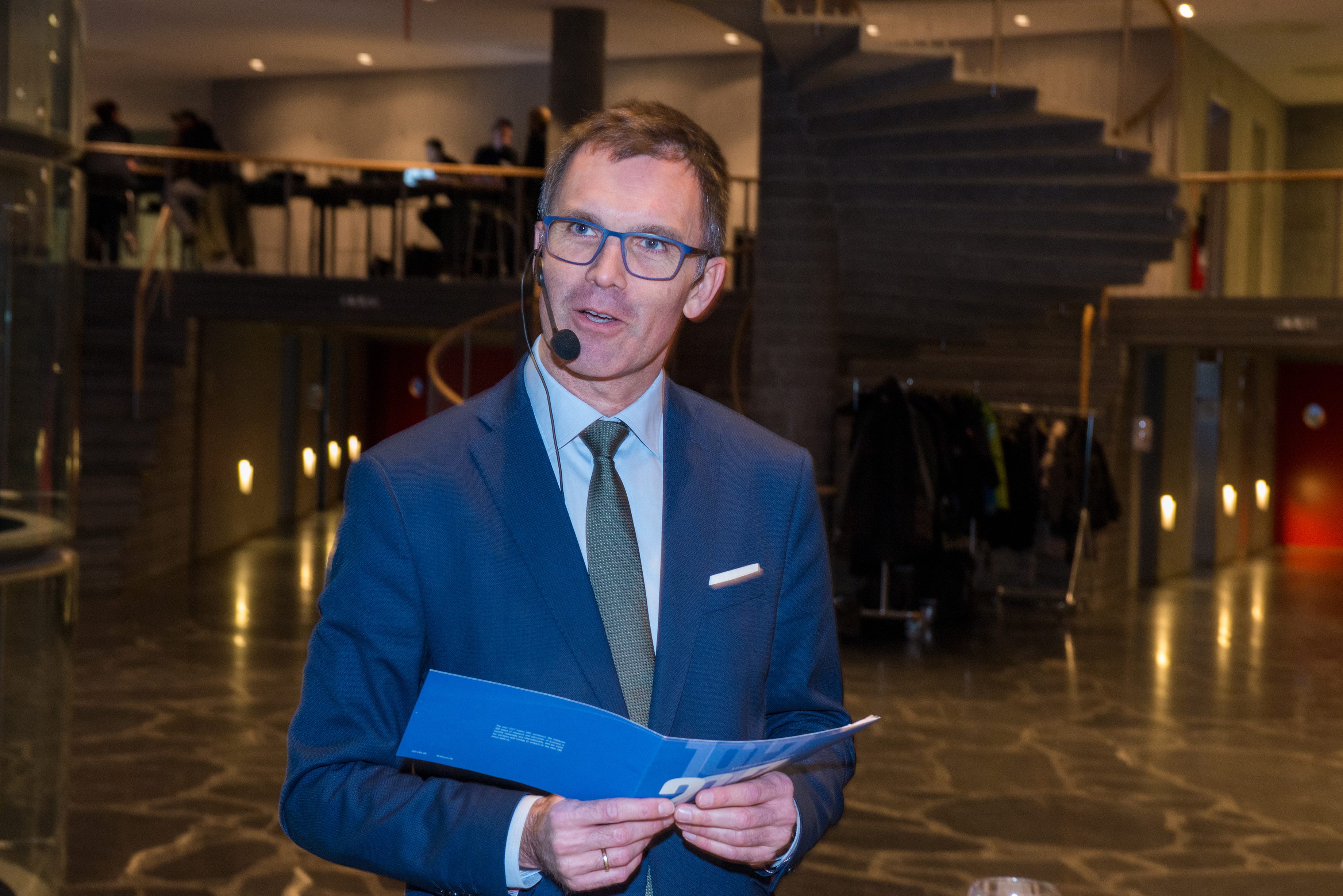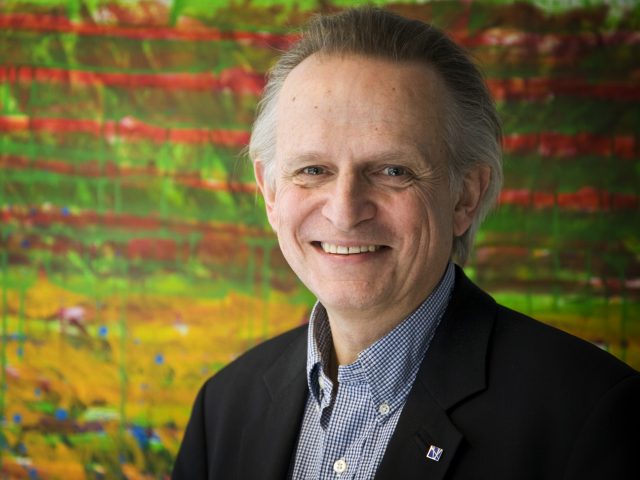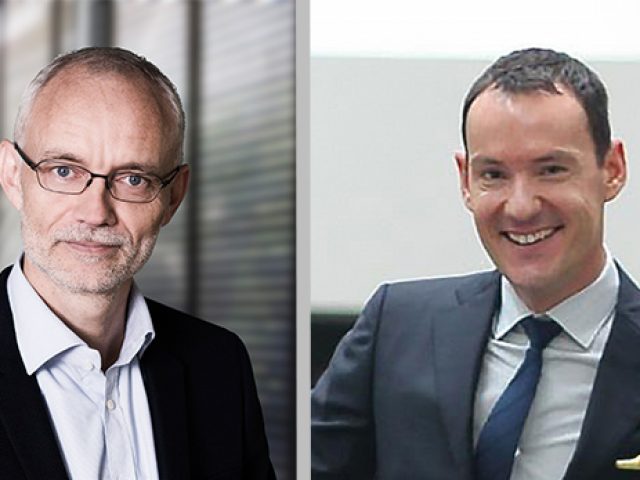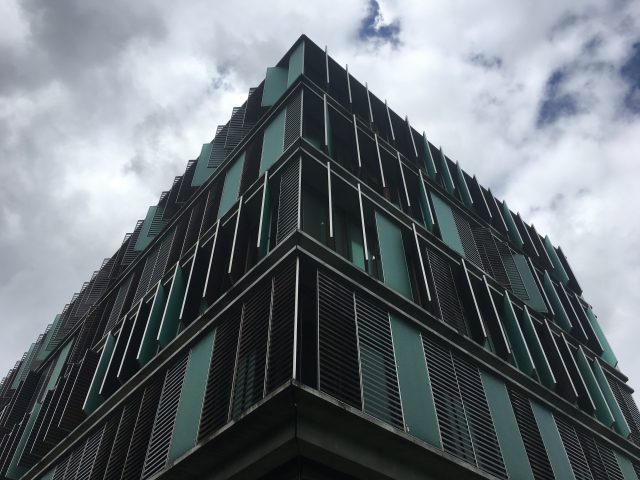A Dean’s goodbye – now he is going to climb Kilimanjaro

Peter Møllgaard, Dean of Research. (Photo: Jørn Albertus.)
Peter Møllgaard resigns as the Dean of Research on the 1st of January. The first thing he is up to in the new year will be to climb Kilimanjaro in Tanzania. CBS WIRE asked Peter Møllgaard five questions about his time as a dean at CBS, and among the answers, he gives three pieces of advice to his successor, Søren Hvidkjær, Head of the Department of Finance.
At Peter Møllgaard’s reception on Monday the 18th of December, he did not want bottles of wine as a thank you for his time as the Dean of Research. Instead, he asked the guests to donate money to his collection efforts for charity, which is tied in with him climbing Kilimanjaro in January.
This is the first thing on Peter Møllgaard’s list of things to do after he resigns from his duties as the Dean of Research at CBS, on the 1st of January. Thereafter, he is to go back to his position as a professor of industrial organization at the Department of Economics.
But how has research changed in the past three years since he has been the Dean of Research, and why is it that he wants to climb Kilimanjaro? CBS WIRE asked Peter Møllgaard five questions about his time at CBS and about what is to come.
How has the research at CBS changed the past three years?
Methods for research don’t just change in a couple of years. What I have been working on is to ensure the balance between the rigorous and the relevant. In this sense, we try to be relevant towards society and the business community.
I have been working hard to get external funding for CBS – as CBS is really badly funded – and for the research projects. For instance, we have got funding from Novo Nordisk Fonden in order to investigate how research affects society.
Getting those funds is a good sign that society and the business community is interested in knowing what they get out of a university like CBS. We need to be really good at explaining what we do via data, and also through good stories about what research can actually do.
Can you name a few examples of CBS-based research that has made a difference for the public?
Lasse Heje Pedersen is a good example of a researcher who has made some thorough articles – which I will not try to explain – about financial matters. His research is being cited a great deal, and he is indeed one of the most cited researchers in the world. He has a big impact on how science within finance develops.
Another example is the Center for Owner-Managed Businesses. The goal of this center is to improve the businesses’ competitive power, and we have got several big grants – mainly from the Danish Industrial Foundation – that are used to study owner-managed businesses, and it spurs a lot of great research.
There’s only one answer to that question: Because it is there!
Peter Møllgaard
For instance, we look into how well-prepared businesses and their owners are for change of ownership, as the archetype of an owner-manager stays until the person is almost dead. This means that a lot of responsibility is tied to that person, and it can be difficult to derive the same potential when that person is gone. So, what we can do is to – based on a cross-disciplinary combination of economists, psychologists, historians and philosophers – investigate this subject from various perspectives, since there is both economical and psychological reasons for why companies don’t get started on the change of ownership on time. And this research is highly relevant, especially for small and medium-sized businesses.
The research goes on two tracks; an academic track, which is about publishing articles, and another track, which is about getting in contact with society and the business community in general. This I why I call it rigorous and relevant.
Why are you going to climb the Kilimanjaro as one of the first things?
There’s only one answer to that question: Because it is there!
And then also because it’s a funny challenge that I want to do with my wife. It’s a good occasion to just go offline and mark that something new is about to happen. I always have these kinds of projects every one or two years, once or twice a year depending on how crazy they are. It’s good to get out and try something completely different, and I have never been above 4,000 meters. Now I will have to reach almost 6,000 meters.
We are going along with a group of people – among whom there will be Danish celebrities, such as Michael Olesen from Dancing with the Stars, Michelle Vesterby who’s a renowned triathlete and Michelle Hviid, a life style expert – in order to collect money for charity. This was why I used the invitation to my reception to advertise this project a little bit, and now I have got a lot of sponsors. For instance, the heads of department want to sponsor me in a way where they pay a certain amount of money for every meter that I climb. CBS as a whole, colleagues, and collaborators from the business community have also sponsored me, and I’m very grateful for that.
When we are done with the climb, my wife and I will go to Zanzibar for a few days just to relax and get warmed up for the rest of the Danish winter.
You don’t want presents for your reception. Why not?
I’d rather collect money and sponsor Børneulykkesfonden, a foundation which supports children and young people. I mean, I can get the red wine I need anyway.
Børneulykkesfonden tries to ensure that children and young people don’t get involved in accidents, but they also have this other initiative called Legeheltene, which – in my opinion – is a really great initiative. When children are hospitalized for a longer period of time, it is important that they also get out and play, not just play games on their iPad or watch TV. They need to get out of the bed and use their bodies. This is what Legeheltene do. They go to the hospitals and play with the children.
This is a really good cause. Better than a bottle of red wine.
Three pieces of advice for your successor?
The first piece of advice was also written in my speech; coherence.
It is extremely important. We have always had some fault lines, which could break down CBS. What I have worked hard for, is to bridge the fault lines and bring together the different disciplines of CBS.
An example of this is that in January, we will launch three BiS Platforms, which are cross-disciplinary and will look into themes such as inequality, diversity, and transformations in terms of big data, disruption, robots, and digitalization.
The second piece of advice is obvious. It is really important for CBS to have talented employees. For the Dean of Research, especially academic staff is important. So, my successor needs to nurture that talent. It is important to both attract and hold on to the talent that we have already got.
The last piece of advice is rather practical. Remember to free up some space in your calendar. It is so easy to get a fully booked calendar with meetings from 8 AM to 8 PM. There has to be times during which you can take a break, call a friend, or whatever is needed. That is extremely important, as I have discovered.




































































































































Comments